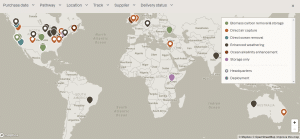The United Nations has issued a stark warning about the escalating risk of famine in Gaza. An alert from the Integrated Food Security Phase Classification (IPC) highlights that food consumption and nutrition indicators have reached alarming lows, the worst since the onset of the ongoing conflict in the region.
According to the IPC, approximately 1.6 million people in Gaza are currently facing acute food insecurity. The situation has deteriorated sharply, with local populations experiencing significant reductions in daily caloric intake and essential nutrients. Food prices have skyrocketed, compounding the challenges for families already grappling with the impacts of the conflict.
Impacts on Daily Life and Health
As food supplies dwindle, many households in Gaza struggle to meet their basic nutritional needs. Reports indicate that over 80% of the population relies on humanitarian assistance, a stark indicator of the severity of the crisis. The situation is particularly dire for children, who are at heightened risk of malnutrition and its associated health complications.
The ongoing hostilities have severely disrupted agricultural activities, leading to reduced crop yields and limited availability of food in local markets. Many farmers have been unable to access their fields due to security concerns, while the destruction of infrastructure hampers the transport of goods.
Food security experts warn that immediate action is necessary to avert a full-scale famine. They emphasize the need for increased humanitarian aid to provide essential food supplies and nutritional support to vulnerable populations. Without timely interventions, the crisis in Gaza could lead to irreversible consequences for the health and well-being of its residents.
Call for International Support
The UN has called for a coordinated international response to address the urgent needs in Gaza. Humanitarian organizations are urging donors to contribute funds and resources to support emergency food programs. The need for a sustained effort is critical, as the impact of the conflict continues to ripple through the community.
In addition to food assistance, experts stress the importance of restoring agricultural activities to ensure long-term food security. Rebuilding the agricultural sector will require not only immediate funding but also a stable security environment that allows farmers to work their land without fear.
The situation in Gaza serves as a reminder of the profound human cost of conflict and the urgent need for a collaborative international effort to alleviate suffering and promote stability in the region.




























































